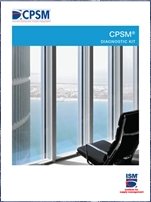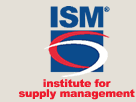Home > Publications > eSide Supply Management

CPSM® Update
3 Questions, 3 Answers
January/February 2011, eSide Supply Management Vol. 4, No. 1
eSide offers sample questions (and answers) from the CPSM® Diagnostic Kit.
In every edition, eSide offers three sample questions — and answers — from the CPSM® Diagnostic Kit to help you prepare to pursue your CPSM® certification. First, answer all three questions; then, scroll down to the "3 Answers" section to find out how you fared.
3 Questions
Question #1: Which of the following is the LEAST critical element in a best alternative to a negotiated agreement (BATNA)?
- Alternate products
- In-house capabilities
- Source options
- Supplier capabilities
Question #2: Qualitative methods such as the Delphi Method are forecasting models based on
- cause and effect relationships
- the collective judgment of individuals
- trend, seasonality, cycles and randomness
- demand and usage requirements
Question #3: A supply manager wishes to align the goals of the organization's procurement function with its strategic financial metrics. Of the following, the MOST appropriate approach would be to

- send staff members to finance courses
- select the metric with the greatest impact
- base the department's goals upon corporate objectives
- report on diversity supplier spending
3 Answers
Question #1: Option D is correct because the other three options are defined as key elements enabling supply management to negotiate from a position of increased strength. The capabilities of the supplier with whom one is negotiating are certainly important, but do not have as much influence on the buying organization's BATNA. Availability of source options (Option C), in which other suppliers also offer acceptable products or services, is usually the simplest to consider. Though alternate products or services (Option A) still provide negotiating strength, their use may require more extensive evaluation or agreement from internal customers. If in-house capabilities (Option B) already exist, this will be easier for the supply manager to consider than if these must be developed.
References: CPSM® Study Guide, 1st Edition (Book 1 — Foundation of Supply Management), pages 22-23; ISM Professional Series (Book 1 — Foundation of Supply Management), pages 173-174.
Question #2: Option B is correct. Qualitative methods are non-numeric by definition and use the opinions of people considered knowledgeable to determine the results. The Delphi Method uses several "experts" and asks them for information in a separate survey iterating through several rounds of questioning to move toward a consensus. Option A is incorrect because cause and effect relationships are used for problem-solving and deal with current data. They are not used for forecasting. Option C is incorrect because although trends, seasonality, cycles and randomness are used in forecasting, they are quantitative, not qualitative. Option D is incorrect because future demand and usage requirements are key components of forecasting and are numeric, therefore quantitative, not qualitative.
References: CPSM® Study Guide, 1st Edition (Book 2 — Effective Supply Management), pages 24-25, 5; ISM Professional Series (Book 2 — Effective Supply Management Performance), pages 142-147; The Supply Management Handbook (7th Edition), pages 610-611.
Question #3: Option C is correct because goal alignment seeks to relate employee, function and department efforts to the vision and mission of the larger organization. Training (Option A) may improve staff members' understanding of financial issues and thus improve their support of related goals. Selection of metrics (Option B) will be part of plans to monitor performance against updated departmental goals. A report on diversity supplier spending (Option D) is not specifically related to strategic financial metrics, though it may include financial information.
References: CPSM® Study Guide, 1st Edition (Book 3 — Leadership in Supply Management), page 23; ISM Professional Series (Book 3 — Leadership in Supply Management), pages 65-71; The Supply Management Handbook (7th Edition), pages 24-28.
For more information on ISM's professional credentials, visit the Institute's website.
Take me to the eSide home page.
Related Resources:CPSM® Exam 1 Study Guide - A study tool for the CPSD ™ designation |
Content Recommendations:Talent Development and Retention |
-
About ISM
- Overview of ISM
- Media Room
- ISM Board of Directors
- ISM Officers Directory
- Affiliate Officers Directory
- ISM Affiliate Web Sites
- ISM Group and Forum Web Sites
- Frequently Asked Questions
- Chair's Corner
- ISM Annual Reports
- J. Shipman Gold Medal Award
- ISM Awards for Excellence
- Supply Management Month
- Association Governance
- ISM Ethical Principles and Standards
- Activity Calendar
- Principles of Social Responsibility
- ISM Position Statements
- Membership
-
Members Only
- InfoCenter
-
Member Information & Online Tools
- ISM Glossary of Key Supply Management Terms
- Access to CIPS Members Only Content
- Access to Supply Chain Council (SCC) Member Discounts and Resources
- ISM Tool Kit
- ISM Resource Guides
- ContractWare®Net and eTool Agreements
- Address Update Form
- Activity Calendar
- Affiliate Websites
- Group & Forum Websites
- ISM Principles and Standards of Ethical Supply Management Conduct
- ISM Group/Forum Enrollment Information
- Job Descriptions
- The Business Source
- Propurchaser.com
- eVendor Check
- Personal Professional Development Scorecard
- Affiliate Resources
- Career Center
-
Affiliate, Groups & Forums
- Affiliate, Group/Forum Award Information
- Group/Forum Enrollment Information
- Group/Forum Enrollment Form
- Groups & Forums Brochure and Flyer
- Group & Forum Case Studies
- Groups & Forums Promotion
- Spotlight on Groups and Forums
- Group and Forum Officers
- Affiliate Web Sites
- Group & Forum Web Sites
- Affiliate Officers
- ISM Officers
- Sign up for ISM's Groups and Forums Discussion List Servs
- Search for Speakers
- Discussion Forums
-
Additional Resources
- ISM Resource Guides
- Bid Specifications Database
- Purchasing/Supply Management Periodicals
- Other Web Resources
- Practix - A quarterly Best Practices publication
- ISM's Principles and Standards of Ethical Supply Management Conduct
- Associations/Organizations Useful to Purchasing/Supply Management Professionals
- CIPS Study
- Search Articles
- CIPS Members Only Content
-
Ethics and Social Responsibility
- ISM Ethical Principles and Standards
- Principles of Sustainability and Social Responsibility
- Business Case
- Supporting Organizations
- Fostering Sustainability and Social Responsibility Form
- Research
- Articles
- General Resources
- Training
- Assessments
- Metrics and Indices
- International
- ISM's Committee on Sustainability and Social Responsibility
- Job Descriptions
-
Education - Seminars, Conferences
- Conferences
- Seminars
- Knowledge Center — Online Courses
-
ISM-ADR School for Supply Management
- Customized and Standard Training and Development
- Professional Development Seminars (In-house, Instructor-Led)
- Knowledge Center Courses (Web-based, Online)
- DNA (Development Needs Analysis)
- ISM-ADR School for Supply Management Brochure
- Summary of all Program Formats
- Your Dedicated Program Managers
- Request for Professional Development Information
- Speaking Opportunities
- Speakers Directory
-
Academic/Student Opportunities
- ISM Education Resource Committee ERC
- ISM Academic Research Support Programs (Grants)
- North American Research Symposium (NARS)
- R. Gene Richter Scholarship Program for Undergraduate Students
- Scholarships Offered by Affiliates, Groups, and Forums
- Colleges and Universities Offering Purchasing/Supply Management Courses
- ISM Approved Programs
- Glossary of Key Supply Mgmt Terms
- ISM Resource Guides
- ISM Tool Kit
- Exhibiting/Sponsorship Opportunities
- Products
- Publications
-
Professional Credentials
- Frequently Asked Questions
- Certified Professional in Supply Management®
- Certified Professional in Supplier Diversity
- Certified Purchasing Manager (C.P.M.)
- Accredited Purchasing Practitioner (A.P.P.)
- Certification Forms
- Work Experience Information
- Credentials Discussion Forum
- Credentials Verification
- Additional Program Information
- International Certification Contacts
- Supply Line 2055: Certification Update
-
ISM Report On Business®
- Latest Manufacturing ROB
- Latest Non-Manufacturing ROB
- Reports On Business® Overview
- Report On Business® Brochure
- Semiannual Reports
- Seasonal Adjustments
- Manufacturing Data
- Non-Manufacturing Data
- ROB Graphical Data
- Regional Business Survey Data
- How to Respond to ROB
- ROB Online Infokit
- JPMorgan Global PMI Reports
- Other Economic Information
- ROB Release Dates
- ROB Frequently Asked Questions
- ISM/Forrester Research Report
-
Career Center
- Your Profile
- Register for the Career Center
- Job Seekers
- Employers' Corner
-
More Career Resources
- Job Descriptions
- Job Hunting Sites on the Web
- Job Hunting Sites for Specific Regional Areas
- Job Hunting Sites with Tools Such as Resume Writing Advice
- Careers In Supply Management
- Resources on Relocating
- Salary/Career-Building Resources
- Schools Offering Purchasing/Supply Management Courses
- Academic/Student Opportunities
- Frequently Asked Questions
- CAPS Research
-
Tools
- InfoCenter
- Research Tools
- Business Book List
- Discussion Forums
- Directories
- Affiliate Resources
- Group & Forum Information
- eTool Agreements
- ISM's Principles and Standards
- Supply Management Defined
- Other Association Links
- Other Related Information
- The Business Source
- Propurchaser.com
- eVendor Check
- Purchasing & Supply Sourcing Guide
- Access CIPS Members Only Content
- Access to Supply Chain Council (SCC) Member Discounts and Resources

In This Section: ![]()



